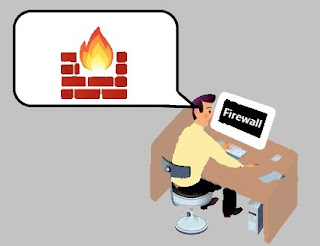Do Firewalls Actually Protect Your Device? Firewalls And Their Functions Explained!
When you hear Firewall, You think of a fire Marshal just
blasting waves of water at a massive fire. You are right when you are in the
realm of the real word but in the case of your device it is relatively closer,
But not the same. The function of a firewall in the real world and in your
device is to keep away the fire. In terms of your device though the fire is
malicious software and other crappy things that harm your device. Fun fact, The term "firewall"
originally referred to a wall intended to confine a fire within a building.
Read the article till the end to know what Firewall actually is and what it
does!
In the territory
of Technology, Specifically your device Firewall acts as a protective layer,
Which protects your device from Malware and Ads on desktop. According to its
definition, Firewall is a network security system that monitors and
controls incoming and outgoing network traffic based on predetermined security
rules. Firewall is used as a protective layer between you and the filthy internet.
Your firewall actually determines whether if you asked for a certain webpage on
the browser or a request to download a certain type of software. Firewall
analyses each and every incoming or outgoing request or response and acts
against malware and crapware.
Firewall also kicks in, When you are
downloading or installing a program on your device and confirms that you wish
to install the programs and it is safe. The new way developers are using to
come around Firewall to install malware on your device is by hiding the request
to install some of the sponsored programs among many other important ones like
in the image below. So the next time you just click on “Next” just make sure
that you are only installing required programs and not anything else. Firewall
functions with the help of both Hardware and Software. Hardware sitting on top
of your router and Software prompting you every time you install a new program.
Firewalls are often categorized as
either network firewalls or host-based firewalls. Network
firewalls filter traffic between two or more networks and run on network
hardware. Host-based firewalls run on host computers and control network
traffic in and out of those machines. In it’s initial stage it was only used
for surveillance of network transfer and was called packet filter. Firewalls
are generally categorized as network-based or host-based. Network-based
firewalls are positioned on the gateway computers of LANs, WANs and intranets.
Host-based firewalls are positioned on the network node itself and control network traffic in and out of those
machines. Firewalls also vary in type depending on where communication
originates, where it is intercepted, and the state of communication being
traced. Speaking of tracking, We recently also posted an article on our blog
regarding how sites track you using cookies, Don’t miss out on this article to
know about the state of your privacy. ( **Spoiler Alert**: It’s Dead.)
That was our take on how Firewall saves
you from malware and crapware and how to overcome it by checking what you are
installing in the installer Wizard. We hope next time you install a program you
check all the boxes and don’t install crapware. To be safe and read more of
such informative articles and Tech news, Subscribe to Rohan Wayangankar’s Blog.
To
Know More About Tech, Subscribe To Rohan Wayangankar’s Blog.












No comments:
You're the Best!